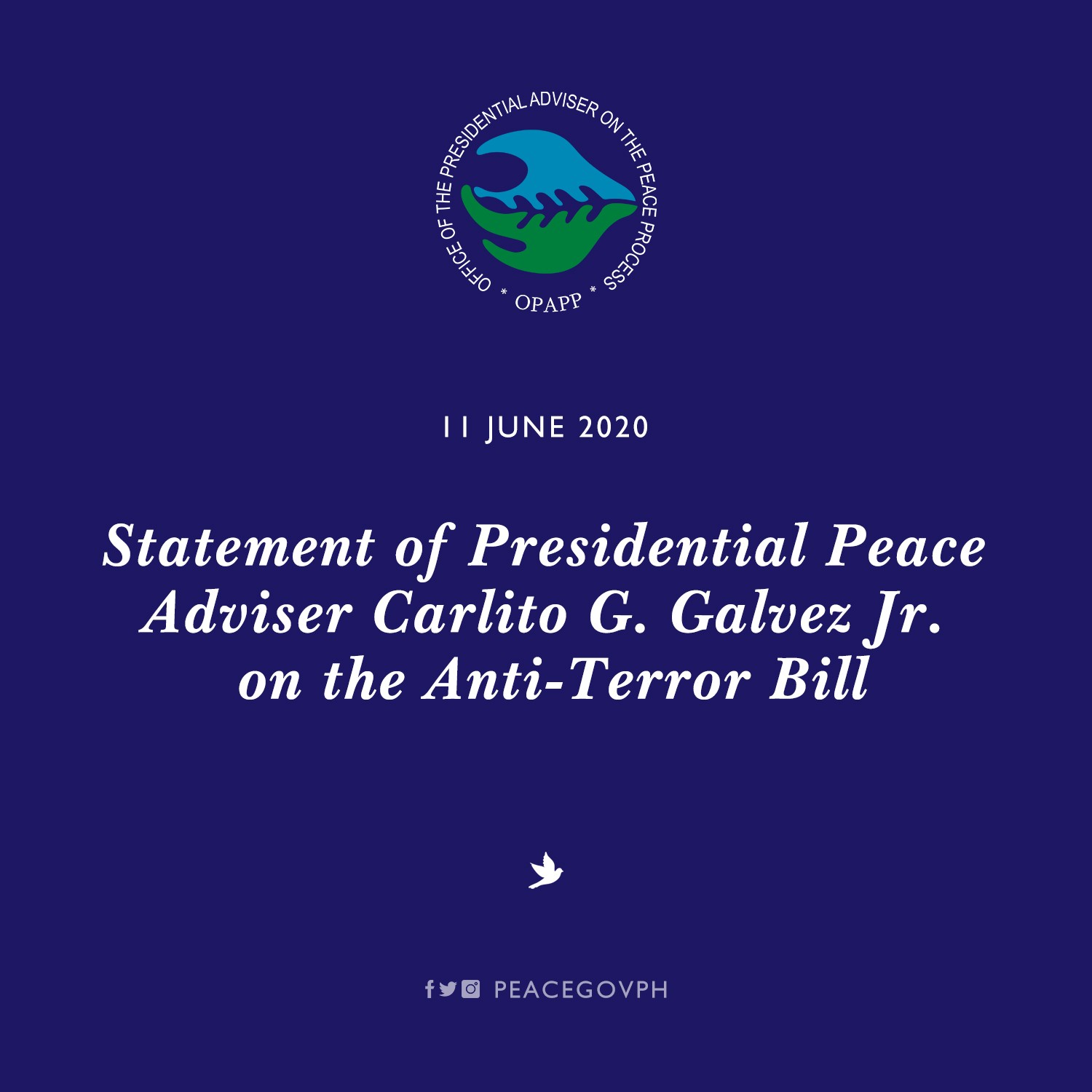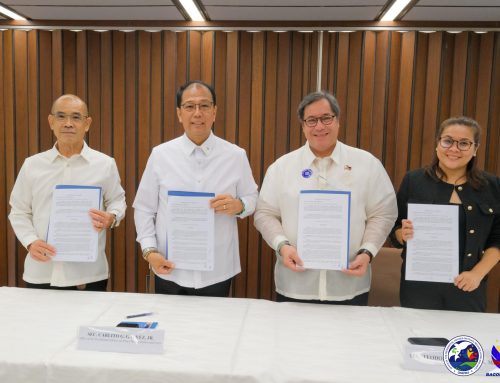There is a debate raging across our nation on Senate Bill No. 1083 and House Bill No. 6875 or “An Act Defining, Preventing and Penalizing Terrorist Acts, Repealing for the Purpose Republic Act No. 9372 Otherwise Known As The Human Security Act of 2007 And Appropriating Funds Therefore.”
The law, which is referred to as the Anti-Terrorism Bill, is now on President Rodrigo Duterte’s table waiting for his signature. It was the President himself who certified the piece of legislation as urgent when he wrote the leadership of Congress, specifically asking Speaker Allan Peter Cayetano to fast track its passage.
In his letter, the President stressed the proposed law has to be enacted soon “to address the urgent need to strengthen the law on anti-terrorism in order to adequately and effectively contain the menace of terrorist acts for the preservation of national security and the promotion of general welfare.”
While it is our inherent right as citizens to express our views on matters which we feel might pose a threat to democracy and our way of life, we must also carefully weigh-in on the current peace and security situation and the events which necessitate the bill’s approval.
All across the globe, the purveyors of violence are making their presence felt and are doing so with impunity. Over the past several years, the cities of New York, Tokyo, London and Paris, have been the sites of some of the most gruesome terrorist attacks the world has ever seen.
Nobody thought that such incidents could happen, especially in first-world countries which have the most sophisticated security and surveillance systems in place. But they did happen, and nations were forced to reassess and recalibrate their response to such threats.
Right after the 9/11 attacks, the United States government passed the USA Patriot Act, as well as implemented other executive orders and other counter-insurgency measures which aim to defend the country against impending threats to the nation’s peace and security.
In the United Kingdom, suspected terrorists can be held by the government for 90 days, while in Japan, the state can conduct a probe among suspects even without the presence of their lawyers and can be detained for 23 days per charge without the possibility of posting bail.
Indonesia has an anti-terrorism law which makes it legal for the government to implement extended pre-charge and pre-trial detention for suspects, which can last for 120 days.
In Malaysia, suspects can be detained for as long as two years, while in Singapore, authorities can block all communication-related activities on site such as the taking of photographs and the sending of video, text and audio messages during terror attacks, while having the power to detain suspects for 720 days.
In the Philippines, nobody imagined that attacks in the scope of 9/11 or the ones carried out in Paris would ever occur on our shores. But the 2017 Marawi siege happened, which made us realize our country’s vulnerability to such acts of terror.
I was the commander of the Western Mindanao Command (WestMinCom) when the Maute and Abu Sayyaf groups laid siege to the city for five months. I witnessed the death, pain and destruction caused by that incident which will forever be etched in my memory.
As I attended the wake of my men who perished during that war and consoled the families they left behind, I promised myself that I will do everything possible to ensure that such incidents will not happen again.
This is why I fully support the bill authored by Senator Panfilo Lacson which is long overdue. It will provide the government the means to effectively engage groups who wish to sow violence, mistrust and discord, and allow our people to live peacefully and without fear in their communities.
For the longest time, state forces have been fighting the enemy with its hands virtually tied behind its back. Although there were already opportunities in the past to get our hands on suspected terrorists, we could not simply because our current laws did not allow us to do so.
As underscored by Sen. Lacson, Congress has put in place all the necessary safeguards in the anti-terror bill to ensure that all the constitutional rights and civil liberties of Filipinos are protected.
The safeguards of the anti-terror bill include Sections 2 and 4, which states that both civil and political rights are protected; Sections 30, 31 and 33 which states that the custodial rights of suspects are protected; Section 42 which mandates the Commission on Human Rights to prioritize the investigation of violations of civil and political rights of individuals; the petition of Habeas Corpus may immediately be filed in court; criminal charges may be filed against erring law enforcers who could face imprisonment of up to 10 years; and unlawfully arrested persons can file for civil indemnity, the amount of which shall be determined judicially by a court.
Specifically, under Section 2 and 4 of the anti-terror bill, terrorism does not include advocacy, protest, dissent, stoppage of work, industrial or mass action or other similar activities if they are not intended to cause death or serious physical harm to others.
Sections 25 and 26, on the other hand provide for the designation of terrorist individual, groups of person, organization or association and the Proscription of Terrorist Organization, association or group of person by Court of Appeals.
On the question of whether the Anti-Terrorism Council (ATC), can conduct surveillance of any person, Section 16 of the anti-terror bill says there are stringent requirements that must be complied with by authorities before such surveillance can be carried out.
The military and police must first secure a written authority from the Court of Appeals. However, before the said authority can be obtained, a prior authority must be issued by the ATC.
The bill provides a 14-day detention period, which is allowed in the Philippine Constitution. There is no provision in the Constitution which explicitly states the number of days a suspect can be preventively detained.
Moreover, the 14-day period will enable authorities to gather intelligence information and evidence against the terror groups, while at the same time, isolating suspects from their cohorts who might retaliate against the former.
By and large, the bill will provide our criminal justice system the much-needed legal backbone to handle the threat of terrorist organizations whose means of achieving their goals continue to evolve and become more sophisticated.
This is contrary to what critics of the bill are saying. Those who are peddling the idea that the implementation of the law will curtail human rights are totally misguided. They are merely creating their own ghosts and twisting the main intent of the bill.
As what Sen. Lacson has said, “Terrorism knows no timing nor no borders.” Put in another way, what the good senator is saying is that terrorism does not choose its victims and will strike at the most unexpected time.
Let us remember that the bill was carefully deliberated by our legislators to separate those who use violence to achieve their goals from those who abide with the law and choose peace.
While we await President Duterte’s decision on the bill, let us remember the many gains we have achieved in the Philippine peace process and how all of these relate to our efforts to bring sustainable development and long-lasting peace to conflict-affected areas in the country.
For instance, the passage Bangsamoro Organic Law and the establishment of the Bangsamoro Autonomous Region in Muslim Mindanao are a testament that good things come to those turn away from acts of violence and walk the path of peace.
With the implementation of the anti-terror bill, we shall not only be preserving the inroads of the Bangsamoro peace process, but also convince members of terrorist groups to abandon their errant ways, return to the folds of the law, and become peaceful and productive citizens. ###












